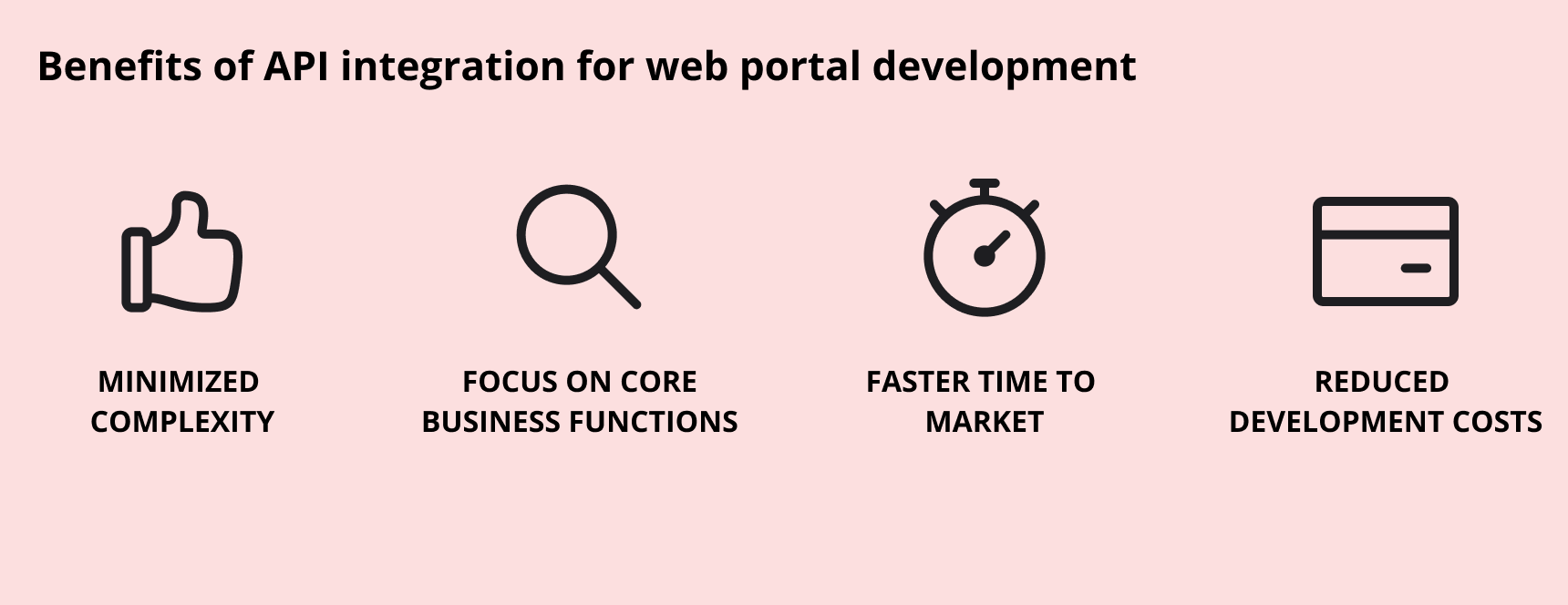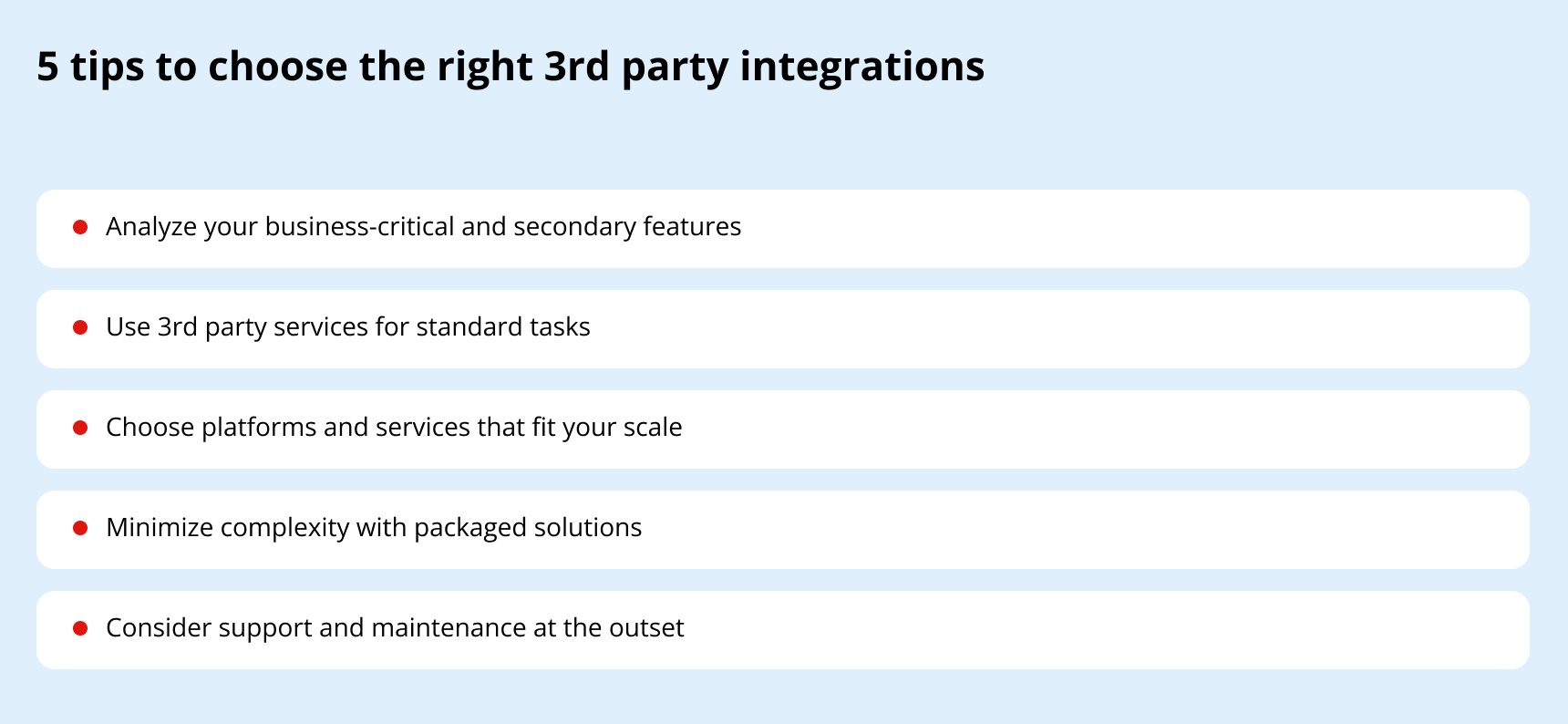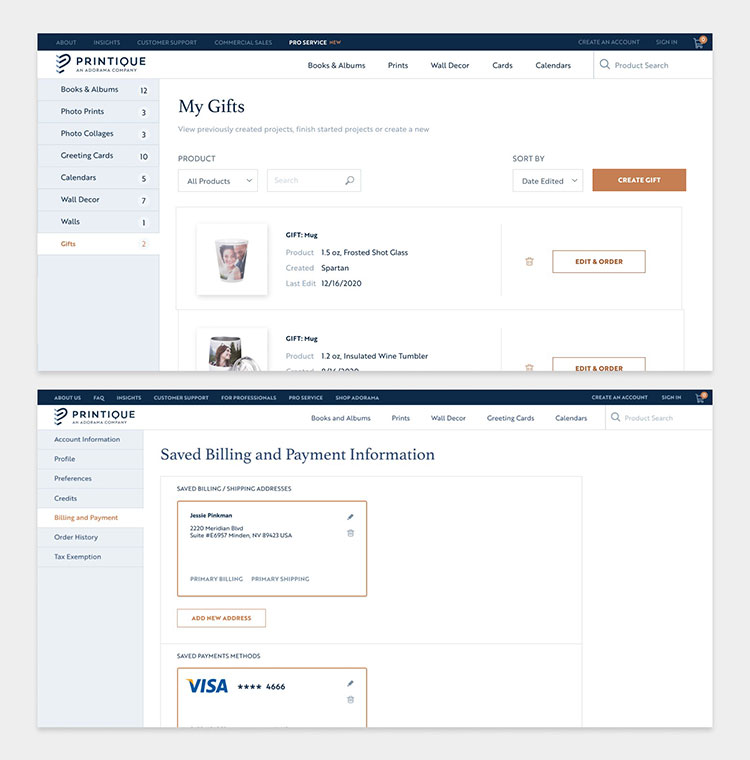Web Portal Integration: How to Speed up Your Custom Portal Development
Web portals drive automation, cost savings, and operational efficiency in all core industries, including logistics, retail, manufacturing, and healthcare.
The global healthcare portal market alone is projected to reach $5.8 billion by 2028, underlining the increasing role of web portal integration into healthcare operations.
But building a web portal takes time and requires a significant upfront investment. On average, the cost of a custom web portal starts at 50,000 EURO and may go over six digits depending on features and technologies. And that’s without recurring support and maintenance expenses.
If you are looking for ways to reduce the time and cost of your portal development, you’ve landed on the right page. In the next 5-minute read, we will talk about the role of API integrations and 3rd party platforms in web development. We will also give 5 exclusive tips from a senior tech expert and Digiteum founder, Katherine Lazarevich, on how to choose integrations for portal development to optimize the time and cost of your project.

Let’s say you’re building a house. And instead of complex brickwork, you use a set of pre-made blocks that fit together like LEGO, allowing you to create various structures with ease. Imagine how much time and resources it could save you.
In software development, integrations and APIs do the same trick. Instead of building every component and functionality from the ground up, we use third-party components and services as building blocks. And we use an API as a programming interface that allows commands and data to flow seamlessly between different software modules.
Thanks to a wide choice of integrations for web portals for different tasks — payment processing, mailing and messaging, customer support, etc. — you can develop rich functionality using fewer resources and less time. Other benefits include:
Faster time to market
Integrations are like shortcuts. They help you get your product out the door faster without reducing the number of features. So you can start testing your web portal in the field early on and add new features and functionality based on the feedback from your users.
Reduced development costs
If it takes less time, it costs you less money than if you would attempt to build every component of your web portal from scratch. Cost-saving is one of the primary reasons why companies are using API integration for web portals development. And it works well both for platform-based and custom development.
Saved resources
By choosing out-of-the-box services for standard tasks like customer support or package tracking, you can focus your development resources on the core functionality of your portal. Of course, not all integrations are plug-and-play, and each API and 3rd party system requires analysis (documentation, API endpoints, API servers, etc.) and implementation from your backend developers. But it still shaves weeks off your project timeline and helps with development process optimization.
Minimized complexity
Many people overlook this benefit of using API integrations for portal development. But it is actually one of the most useful strategies to reduce the complexity of your project by using industry-proven services and time-tested components for your portal. Choosing the right integrations will help you mitigate the risks of scope creep and budget overruns.
Create a high-performing web portal without burning your budget
We will help you select the technologies, tools, and integration strategy to build a feature-rich web portal and hit your delivery goals.
PORTAL DEVELOPMENT SERVICESNext, let’s talk about how to choose the best API integrations for web portal development that will match your scale and help you deliver your portal on time and within budget.
We asked Katherine Lazarevich, a seasoned tech specialist with 20 years of experience managing complex web projects, to share her practical insights on how to pick the right integrations for web portals. Here are her tips:

Single out business-critical and secondary features
One of the most crucial choices you will make at the outset is which components to code from scratch and when to consider integrations of web portals with third-party systems. This choice will impact the scope, roadmap, and cost of your project. And it is important in any software project, not only web portal development.
To make the right choice, single out your business-critical features and secondary features. Business-critical features form your competitive advantage and act as the primary service of your business. Custom development for these features will give you better agility and help you create unique functionality that caters to your users’ needs.
Example: When building a web portal for eLearning, use custom development for the unique course workflow and interactive features and third-party integrations for secondary features like one-click login of payment processing.
Use 3rd party services for standard tasks
Look for third-party services or ready-made libraries for standard tasks and secondary features that don’t act as your competitive advantage. Integrations will help you save a ton of time. Moreover, solving simple tasks with API integration for custom portals will let your developers focus on the critical features of your portal.
Example: Take customer support. There are plenty of customer support services and tools for different types of businesses, both B2B and B2C. Developing this module from square one would take your budget off the core features and add unnecessary complexity as your portal grows and requires more support.
Choose platforms and services that fit your scale
When analyzing different platforms and services for your web portal, consider the scale, flexibility, and range of each solution. Then choose the service proportional to the scale of your business and operations. Especially if you pick baseline business applications like CRM or ERP and look into the possibilities to integrate infrastructure for web portals.
As a rule, large-scale business management systems (e.g., SAP and Salesforce suites) provide rich functionality out of the box. Therefore, they require substantial resources and time to customize to your business needs. They also tend to be heavyweight, so mind that if performance is one of your essentials.
Example: When we analyze project requirements, we conduct analysis and help the client define criteria and determine business-critical and secondary features for the project. We then decide on the scope and select third-party systems that best fit set business and technical criteria and the client’s scale.
Minimize complexity with packaged solutions
Modern packaged solutions, such as payment processing or data management, can help you take your integration on the web portal to the next level and save you even more time and money.
Example: Instead of integrating with every payment system individually (PayPal, Apple Pay, etc.), consider all-in-one solutions like payment gateways. They can capture API requests for any type of payment in the package and create a seamless experience for your users.
Consider support at the outset
Often, support and maintenance are treated as an afterthought. It may result in unexpected recurring costs in the future. This is why it’s important to consider the resources and skills you will need for ongoing support and maintenance of different third-party systems as well as the portal in general. It will influence your strategy of integration for custom portal development.
At Digiteum, we specialize in the design and development of complex web systems and have worked on many web projects that prioritize API and third-party integrations.
One of our long-standing clients, a branch brand of Adorama Camera, Printique (US), runs a large-scale high-load web system for dozens of B2C and B2B printing services. We develop custom-built photo editors and photo product wizards for the core services, allowing Printique to maintain leadership in the market for over a decade. Along with custom applications, we use various third-party platforms to enable a seamless eCommerce experience on a customer portal and B2B portal for pro photographers.
- Cloud tools. Cloud solutions for photo upload and storage.
- Social features. Integration with social media for sharing.
- Customer support. Industry-proven platforms for customer support.
- Payment processing. Secure payment processing and transaction management.
- Sign-in. Quick and secure sign-in to a customer portal.
- CRM. CRM platform to manage customer data and automate the whole process.
- Affiliate program. Integration with partner services and partner networks.
- CMS. Modern CMS with a straightforward interface for marketing and sales activities.

Using third-party systems and portal API integrations, we help Printique provide a stellar online experience to millions of customers. We focus the effort of our full-stack dev team on strengthening the core features and adding new products that set the company apart from the competition. As a result, year after year, Printique preserves its leading position as the #1 online photo printing service (Digital Camera World, 2023) and the Best photo printing service (PCMag Editors’ Choice, 2022).
Are you looking for an experienced team to help you design and develop your portal without going over your budget and deadlines? We can help you:
- Clarify and gather requirements and prioritize features for your web portal project based on your business priorities and goals.
- Walk you through the web portal integration process and create an actionable integration strategy for your project.
- Analyze and select the most suitable services and API integrations for custom web portal creation that fit your scale and business needs.
- Design, develop and support your web portal using modern engineering and DevOps practices.
With over a decade of experience in web development, we help companies in logistics, healthcare, eCommerce, cleantech, agriculture, and other industries leverage integrations to speed up their project deliveries and cut development costs. We offer end-to-end web portal development services and have rich experience in modern technologies for portal development, including top programming languages and platforms (.NET, Java, Python, Node.js, React, Angular), cloud and data management technologies.
Accelerate your web portal development
Create a web portal with full control over delivery and costs and laser focus on your business goals.
HIRE WEB PORTAL DEVELOPERSShort wrap-up
- Integration of a web portal with 3rd party services and platforms will help you speed up time to market, reduce development costs, eliminate complexity, and focus development resources on the core business functions.
- When choosing your integration strategy, determine standard tasks and secondary features that can be built using 3rd-party services.
- Consider the scale of your business and operations to choose proportional platforms and tools.







